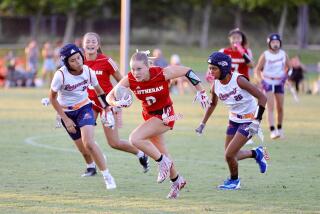El Camino Harriers Begin Race for Titles : Both Men’s and Women’s Teams Have Long History of Success
El Camino College, a two-year school, will lose some of its best cross-country runners when the school year ends. But the losses should not hurt a flourishing program.
Since 1978 the Warriors hold a 113-9 mark in dual meets. In those nine years the women’s team has won seven of 10 South Coast Conference championships, and the men’s team has won six of 10 in addition to two Southern California regional titles and two state championships.
Saturday in Fresno, Coach Dave Shannon will again lead both teams in bids for the state crown.
Shannon, a former Aviation High track coach who has been at El Camino since 1978, said both the men and the women could be among the top three finishers in the state meet. But he has more to say about a program that consistently allows the Warriors to compete against the state’s best community colleges while actually drawing students away from four-year universities.
“When they go to the four-year program, quite often they can’t make the traveling team,” Shannon said. “The competition is so elite that they don’t get to compete.”
Four-year athletes frequently burn out in practice too, Shannon said, because workouts are paced for a team’s premier runners.
The solution?
“I’m always encouraging athletes to start out at community college,” said UCLA track and cross-country Coach Bob Larsen, who coached for 11 years at two-year Grossmont College in San Diego before going to Westwood. “Several high school athletes want to go to four-year universities but aren’t ready.”
Larsen enjoys developing top competitors, but the strength of the Pac-10 Conference forces him to reach for the season’s best runners. Community colleges, Larsen said, make his job easier.
“You can be fooled by good-looking, talented high school athletes,” he said. “Community colleges help us because they give us two more years to look at an athlete and they often give us athletes who can come in and compete right away because they’ve matured.”
El Camino’s program helps those athletes mature. All El Camino students choose their majors when they enter school. That allows them to concentrate on schoolwork, and it lets students involved in running concentrate equally on athletics and academics.
Success often ensues in both areas.
John Federoff, a freshman on Shannon’s team, is getting A’s and B’s while helping his team to a regional championship last Saturday at UC Irvine and a berth in the state championship. A decent performer at South Torrance High School, Federoff had planned to attend Humbolt State. mostly because he was impressed with its coach, who sent him several letters.
But Shannon changed Federoff’s mind. “He promised to get me into a big school,” Federoff remembered.
That promise should be fulfilled. After conversations with coaches, Federoff said a scholarship at Cal Poly San Luis Obisbo or UC Irvine is a definite possibility.
Another runner looking to Cal Poly is sophomore Jill Hoffman, a Bishop Montgomery product. Hoffman, who Shannon said will have to place no lower than fifth tomorrow for El Camino to finish among the top four teams in the state, thinks junior college is an excellent step for many prep athletes.
“I wasn’t sure where I wanted to go,” Hoffman recalled. “There was no way I would have been able to compete at a major college and El Camino was a good transition. It’s not as disciplined a running program and I have lots of time to do homework.”
Time, of course, can be wasted. Shannon sees that it’s not.
“I try to impress upon the students that it’s all a matter of how much they put into academics as to how quickly they can get out of this system,” he said. “I am a surrogate parent now and then. I’m responsible for them when they make the commitment to come here. That is a responsibility you accept and it’s a challenge.”
Shannon’s commitment is most evident when his team trains. The Long Beach State grad continues to run with his women’s team and sticks close to his men though he can no longer keep up.
“He’s lots of fun,” said Federoff, who often hangs around Shannon’s office during free periods, “but when it’s necessary he gets serious. He runs with us and it’s neat to have him up there. A lot of coaches will just drive over to their runners to tell them how far to go. He’s devoted.”
“I understand their fatigue (when working out),” Shannon said. “I want to show them that if I need more effort out of them, I’m there, I know what’s going on.”
Helping the athletes understand the challenges of collegiate competition is an intricate alumni network that supports the latest Warriors with money and encouragement.
Shannon coordinates cross-country alumni support with the help of a 130-person computerized mailing list that he periodically updates.
“I mail everyone our results and lots come to our banquets and lots buy ads in our program, which pays for our trophy and team pictures,” he said.
And when Shannon’s teams see his office wall filled with every team picture since 1976 “they know there is a connection between their success and past teams,” he said. “It just works.”
Shannon’s rapport with high school students adds to El Camino’s success. He can recruit only from specific schools in El Camino’s district, but he said students from other schools contact him, allowing them to run for the Warriors.
“I’m fortunate with local schools,” he said. “We have a steady stream of gifted athletes coming here. We have outstanding high school feeder teams.”
Shannon’s teams may not win the state championships, but he seems assured of continued growth.
The number of high school athletes enrolling at El Camino and the Southland’s other junior colleges figures to grow, according to UCLA’s Larsen. The NCAA’s Proposition 48--requiring college freshmen to score at least a combined 700 on entrance exams and to receive at least a C average in core classes--is providing the food for that growth, Larsen said.
“Prop. 48 is the big thing,” Larsen said, “because the tougher NCAA rules force more superior athletes to go to community colleges.”
More to Read
Get our high school sports newsletter
Prep Rally is devoted to the SoCal high school sports experience, bringing you scores, stories and a behind-the-scenes look at what makes prep sports so popular.
You may occasionally receive promotional content from the Los Angeles Times.






